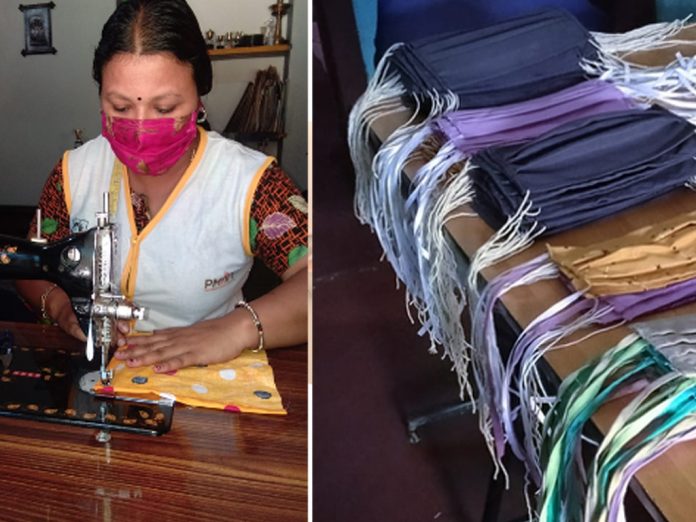During this unprecedented national lockdown, Amrita’s PMKVY family has demonstrated once again that they thrive in times of hardship. While all of our students, staff and their extended families have thankfully remained in good health, the lockdown has begun to take a toll on the students’ skill development trajectory. Determined to ensure the lockdown didn’t further impede all that had been gained so far, Amrita’s PMKVY training team stepped into action. Amrita PMKVY currently operates nine training centres in six districts across five states: Kerala, Tamil Nadu, Odisha, Chhattisgard and Jharkhand.
The following brief reflects experiences shared by Amrita’s PMKVY training team across these locations, on what they are doing in their respective regions to maintain teaching-learning continuity through online and distance learning methods in this period of the national lockdown. The training team also shares what they are doing to raise community awareness and stem the spread of the virus in their communities.
“The lockdown started to disturb me especially because I was beginning to lose touch with the course curriculum and my fellow classmates.”
Amrita PMKVY Student
Amrita PMKVY Launches Distance-Learning Classes
As reality began to set in that the lockdown would last longer than expected, concerns developed among students and trainers that the lack of continuity would affect the students’ aspiration levels, their ability to retain all that had been learned so far, or even result in student drop-outs. In response to these concerns, Amrita’s PMKVY training teams across the nation swung into action to conduct classes via distance learning methods.
After building consensus among the respective training teams on the strategy and approach to deliver courses online (via mobile communication apps such as Whtsapp) or offline via conference call, trainers set out to design their own teaching methods and content to suit the modified training contexts.
Currently, Whatsapp is the most preferred mode of online instruction among the Amrita-PMKVY trainers, wherever possible. Whatsapp based instruction was found to be a “quick-fix” solution particularly since course and batch-wise whatsapp groups were already in place (as a part of Amrita’s standard enrollment protocol), prior to the lockdown. Below are some examples of how trainers are utilizing Whatsapp to conduct courses.
“I believe that audio notes [of the trainer] are useful, I can listen to them whenever I want, which helps in revising the previously taught topics.”
Amrita PMKVY Student
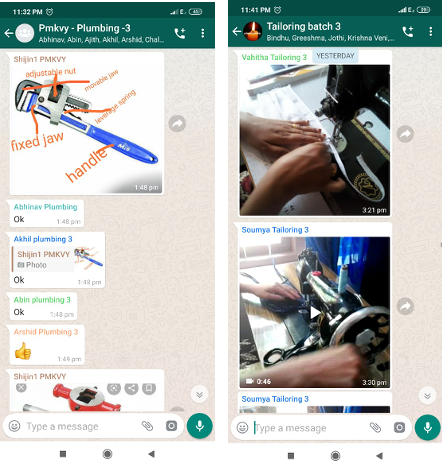
(Pictured on the left) – An Amrita PMKVY Plumbing Trainer downloads and shares images of tools with students via Whatsapp and asks them to identify and label its parts. (Pictured on the right) An Amrita PMKVY tailoring trainer created her own tutorial videos to demonstrate practical portions. Students then take videos and pictures of their work in process and share it with the trainer and other students in the group.
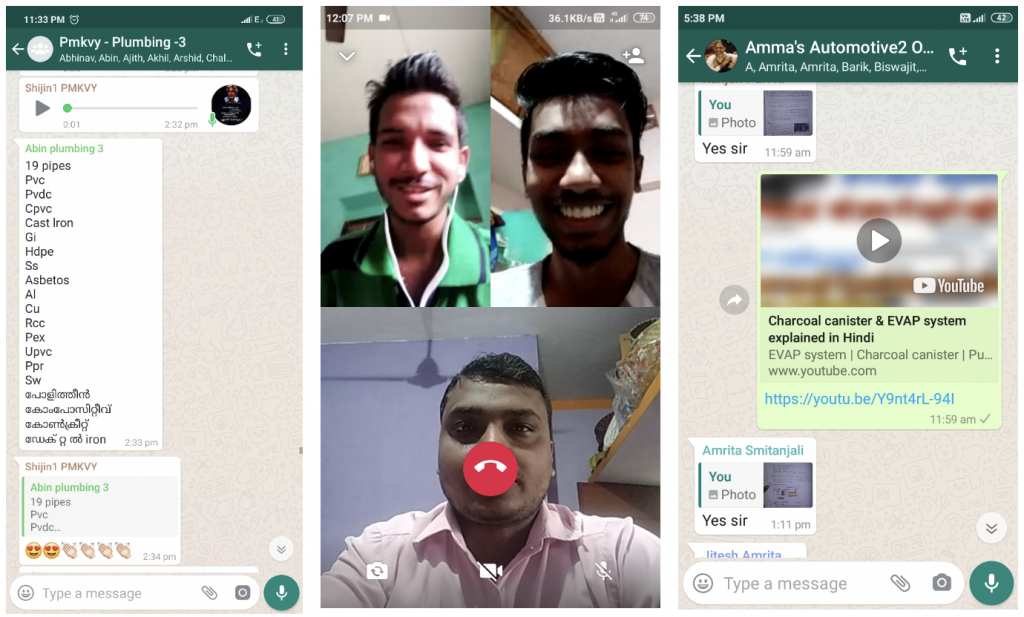
To facilitate teacher-student interaction and attentiveness, trainers post audio-based discussion questions, to which students reply.
Where internet based tools were failing due to connectivity or technology access issues, trainers are also conducting courses via mobile phone conferencing.
Maintaining Continuity
Even in these modified and resource limited conditions, trainers have managed to include essential components of the teaching-learning experience.
LEE – Amrita PMKVY Trainers and Students Respond to COVID-19
In line with AMMACHI Labs’ integrated vocational training model, Life Enrichment Education (LEE) sessions continue to be conducted via Whatsapp or Conference calls. Trainers share links to videos and or present soft-skill discussion topics, to which students share their perspectives via text or audio-based messages and sometimes have group discussions
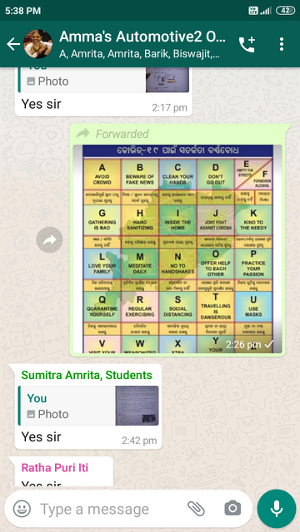 During the Lockdown, COVID-19 continues to be a priority area of awareness. The trainers are also taking special initiative to raise awareness levels amongst their students by conducting quizzes on COVID and encouraging them to read more about it independently.
During the Lockdown, COVID-19 continues to be a priority area of awareness. The trainers are also taking special initiative to raise awareness levels amongst their students by conducting quizzes on COVID and encouraging them to read more about it independently.
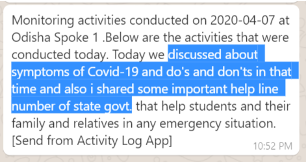 These excerpts from PMKVY training team’s daily reports further indicate the LEE awareness and activities on COVID-19 taking place.
These excerpts from PMKVY training team’s daily reports further indicate the LEE awareness and activities on COVID-19 taking place.
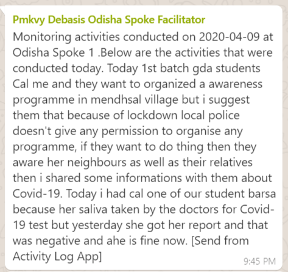 These excerpts from PMKVY training team’s daily reports further indicate the LEE awareness and activities on COVID-19 taking place.
These excerpts from PMKVY training team’s daily reports further indicate the LEE awareness and activities on COVID-19 taking place.
As a part of the LEE curriculum, students are encouraged to find ways to put their increased level of awareness into action through LEE in the Community. The activities are ideated and implemented by students, with support and guidance from their Trainers. In this vein, Amrita PMKVY teachers and students are banding together to spread awareness on the virus, make and distribute masks to those in their local communities.
Students leverage their talents to create social and multimedia messages to get the message out on preventing Covid-19.
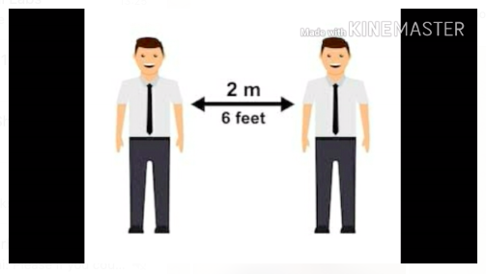 Screenshot of an awareness video created by an Amrita PMKVY Student.
Screenshot of an awareness video created by an Amrita PMKVY Student.
 A PMKVY student created an animation to convey the following message on coronavirus – “Stay Home, Stay Safe.”
A PMKVY student created an animation to convey the following message on coronavirus – “Stay Home, Stay Safe.”
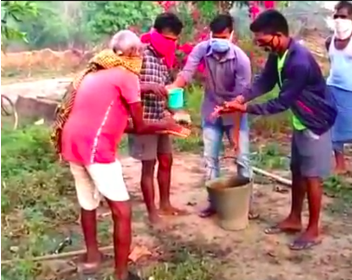 a group of Amrita PMKVY students provide training to elder members of their own community on how to properly wash hands.
a group of Amrita PMKVY students provide training to elder members of their own community on how to properly wash hands.
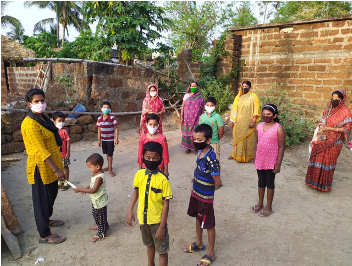 Pictured center and right, Amrita PMKVY students distributed masks and conducted awareness classes on COVID-19 to children and women within their own village.
Pictured center and right, Amrita PMKVY students distributed masks and conducted awareness classes on COVID-19 to children and women within their own village.
Since the lockdown, Amrita PMKVY students have stitched and distributed over 2,000 masks to their local community members, along with gloves to common gathering areas such as public health centres, petrol pumps, shops, banks and also to policemen, social workers and utility workers. While the Tailoring students are certainly putting their learned skills to use, students across the various courses are also pitching in to help with this effort.
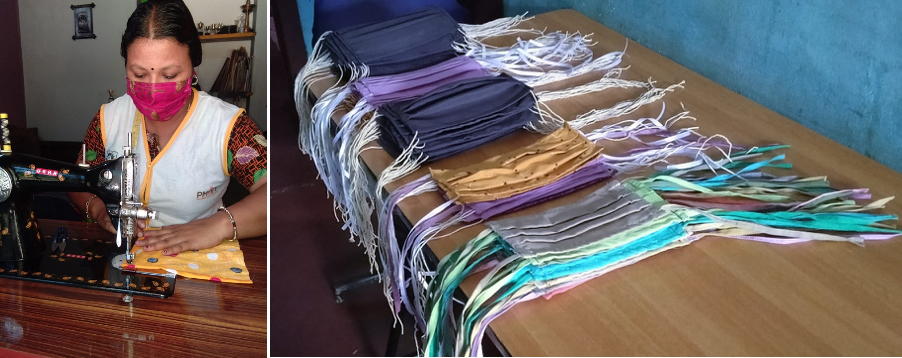
“In the first week of the lockdown we started a whatsapp-based course, our trainer shared a tutorial video on stitching facemasks. This helped us to stitch facemasks for ourselves and others.”
Amrita PMKVY student
Peer to Peer Learning
Despite limited infrastructure, one DDEO Trainer shared his strategy on how he is able to encourage peer-to-peer learning:
“Sometimes students are not able to attend the whatsapp call on time [internet connectivity, household duties, etc.] In such cases, these who miss out check the whatsapp group for updates when time and network permit and then call a classmate who was present for the class to learn more in detail. After which the student texts me what he/she has understood.”
Assessments
To evaluate the effectiveness of the online course format, trainers conduct individual assessments with students either through whatsapp video or regular phone calls. One trainer shared his experience and learnings from conducting assessments in this modified teaching setting:
“At first, I conducted quizzes on whatsapp but found that students could easily see each other’s responses and copy. So then I learned about google forms from Ammachi Labs, I watched a few videos and then tested it. When I started using Google forms for quizzes, I realised how students could not simply copy their classmates’ responses and it became faster and easier for me to track their performance. For those who don’t have internet access, I call them and mark pages from the soft skills component of DDEO textbooks. They’re required to study and make telephonic presentations to me on the topics. I have told them once class resumes they will have to teach the others these topics. Whereas those who are taking the online quizzes will have to help the offline students catch up on the technicals.”
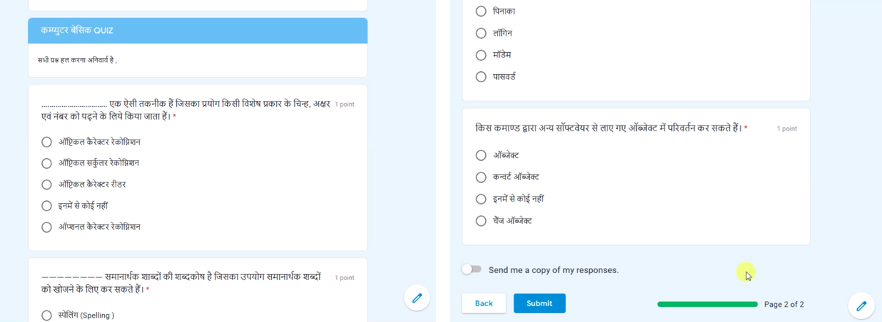 A sample quiz created and delivered through google forms.
A sample quiz created and delivered through google forms.
Monitoring and Evaluation
Trainers hold post-session reflection discussions via whatsapp or phone on a daily basis to capture observations and lessons learned from day’s classes as a way to course correct and improve the training experience. In the following excerpt, trainers shared their reflection on not being able to reach as many students as they would have liked to during this time:
“We don’t feel that it is a lack of interest or motivation that all students are not able to participate in the online-courses. There could be a variety of reasons such as family commitments, connectivity in only specific areas of their village, etc. Additionally, we found that a couple of students were a little scared of participating in the online-class format due to typing in English. So then we encouraged them to send responses by voice and that made it easy for them to participate. We’ve gotten good feedback from those that are participating in the online course so far. From now onwards, we would like to bring them together online. In this situation, the students may be going through mental distress, so the online courses enable some interaction even if they’re not able to come to the center everyday.”
Reported Challenges to Distance Teaching-Learning Mode
Amidst the numerous benefits of distance-learning during the lockdown period, trainers and students reported some challenges.
- With respect to the number of students that can participate in a video-based Whatsapp call at a time (i.e. 6 to 8 people permitted at a time). To remedy this issue, depending on the number of students that have access to whatsapp, trainers will offer the class within batches. The team is also looking into other technologies that will enable a greater number of students to attend the online class together.
- Trainers observed that some students find it difficult to operate in a self-study format. Curated interactive sessions and maintaining contact between trainers and students are thus critical to helping ensure students are processing training content.
- Given current limitations in handling practical sessions online, many of the centers are currently conducting revision sessions of the theory sections.
- Practical sessions are anticipated to become a greater concern, if the lockdown were to extend further. In preparation for this possibility, trainers are identifying training content through Youtube and other open educational resources, as well as methods that could enable practical practice in the villages. One DDEO Trainer already identified courses that can be taken online (for those with computer and internet access) and registered his students in the courses (i.e. http://learnvern.com/), provided free of charge by the Govt. of India.
Lessons Learned and Recommendations
- A primary challenge affecting the delivery of online courses is connectivity and access to technology and internet bandwidth in villages. While not being able to display or view visual aids is an apparent challenge to the phone conference format, daily interaction between the teacher and students was reported to help address the issue of continuity and the risk of diminishing aspiration levels.
- Students’ attention span was observed to be shorter in the distance-learning training mode versus the standard teaching mode (classes at the training center). It was found that decreasing lecture time and increasing interaction/discussion between the students and teacher helped maintain students’ interest levels.
- Despite efforts to actively monitor students’ participation in the whatsapp-based courses with the tools at hand, challenges were reported in accurately tracking students’ attentiveness in class. For this reason, video-based interaction is reported to be preferred over audio/text based interaction, whenever possible.
- In order to continuously improve the performance and effectiveness of the alternative training format, the training team holds daily reflection sessions which helps to identify areas of improvement that could be course corrected in subsequent sessions. In this manner, daily monitoring and evaluation is recommended.
- Reminders/Alerts to students to recharge – Commonly reported challenge to students’ participation in online courses were data access and charging facility. To prepare students for the online course, students were informed three days prior to launching online courses and provided with links to offers to recharge data on their phones.
Conclusion
Despite limited infrastructure and teaching resources, the Amrita-PMKVY training teams are taking this challenge as an opportunity to reach their students in various and creative ways. They continue to showcase their dedication and determination to their students and India’s skill development mission. While a complete replication of the training experience as not yet been possible due to apparent limitations, the objective of helping students stay in touch with each other and their skills is evidently being met. We will continue to track the progress of Amrita PMKVY’s training team as they work to keep in touch with their skills during this lockdown period.

